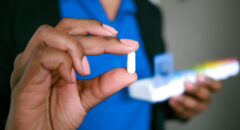
Most know that grapefruit does not mix well with many prescription medications. But now, scientists have expanded the list of medications that interact with grapefruit in potentially dangerous ways.
On the revised list are 43 drugs, up from 17 in 2008. Widely-used cholesterol-lowering statins and blood-pressure medications are among the drugs that might rise to harmful levels in the blood if a patient eats grapefruit or drinks grapefruit juice.
As it stands, there are now more than 85 drugs that may interact with grapefruit. The number of drugs that may result in potentially fatal side effects when mixed with grapefruit increased from 17 to 43 during the past four years. This equates to more than six new potentially risky drugs a year.
The list includes some statins that lower cholesterol (such as atorvastatin, lovastatin, and simvastatin), some antibiotics, cancer drugs, and heart drugs. Most at risk are older people who use more prescriptions and buy more grapefruit.
Here’s what happens: Grapefruit contains furanocoumarins, which block an enzyme that normally breaks down certain medications in the body. When it is left unchecked, medication levels can grow toxic in the body.
It’s not just grapefruits, either. Other citrus fruits such as Seville oranges (often used in marmalade), limes, and pomelos also contain the active ingredients (furanocoumarins), but have not been as widely studied.
Drugs that interact with whole grapefruit, grapefruit concentrate or fresh grapefruit juice have been identified, though not all have serious consequences. Those that do, however, can cause problems that include acute kidney failure, respiratory failure, gastric bleeding — and worse, sudden death.
Part of the concern lies in the fact that people older than 45 are most likely to consume grapefruit juice — and to take prescription drugs. Seniors older than 70 have the most trouble tolerating excessively high levels of drugs, Bailey noted.
These are the individuals with the greatest chance of exposure.
Patients worried about the interaction of grapefruit with their medications should talk with their doctors. And doctors should make sure to ask about grapefruit consumption when prescribing drugs.
Some grapefruit lovers may have cut back already because of the risk of drug interaction. Consumption of grapefruit juice has dropped in the past decade, falling from .44 gallons of juice per person per year in 2000 to .15 gallons per person in 2011, according to figures from the Florida Department of Citrus.
Officials there say that although some drugs do interact with grapefruit, most do not. In most cases, doctors can prescribe drugs in the same class that don’t interact.








